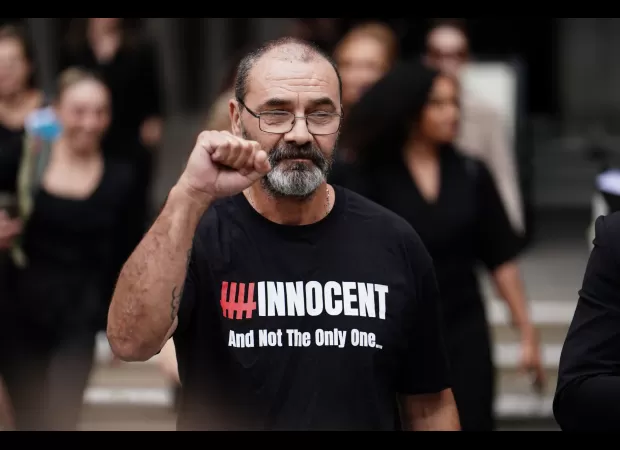Innocent man wrongfully jailed for 17 years now relies on food banks.
Andrew Malkinson, who was wrongly imprisoned for 17 years, now depends on a foodbank and has experienced homelessness.

Andrew Malkinson always maintained his innocence, even during the 17 years he was wrongfully imprisoned. He was convicted of raping a woman while working as a security guard in Salford, Greater Manchester in 2003, but it was later discovered that DNA evidence linked another man to the crime. Finally, in July of last year, Mr. Malkinson was released and began the daunting task of rebuilding his life.
However, instead of being able to move on and start fresh, Mr. Malkinson found himself in a state of limbo as he navigated the complicated compensation system. Despite being owed compensation for the years he spent behind bars, he has not received a single penny from the state. As a result, he now relies on a foodbank to survive, a situation that he never imagined himself in.
In an emotional opinion piece for The Guardian, Mr. Malkinson shared his frustration and disbelief at having to stand in line at a foodbank, grateful for the generosity of strangers. He expressed that he should not be in this position, given what the state owes him. After being released from prison, he was homeless and lived in a tent in Spain, unable to bear being in Britain after his traumatic experience.
Now, Mr. Malkinson lives in a one-bedroom council flat in southern England with his lawyer's cocker spaniel, Basil. Despite being declared a free man, he still struggles with financial hardships. He relies on universal credit, but even that is not enough to cover his expenses. In fact, he is forced to pay back £5 a month for what is considered an overpayment. This is due to him fulfilling his long-held dream of traveling, which unfortunately resulted in him being removed from the NHS waiting list for mental health support.
Mr. Malkinson has faced numerous barriers in his journey to seek justice and compensation. He has had to choose between receiving an interim payment and risking losing his legal aid when he sues the police later. He also faces the requirement to fight a civil claim through the courts before being compensated through the statutory scheme, despite being told that this should not apply to his case.
In his opinion piece, Mr. Malkinson also criticized the government for their failure to adjust the cap on compensation, which remains at £1,000,000 despite not increasing with inflation since it was first introduced in 2008. He believes that those who designed the compensation scheme were paranoid and operating under the delusion that the state was being consistently ripped off by prisoners whose convictions were quashed.
Mr. Malkinson is also advocating for an overhaul of the justice system, including reform of the jury system to ban majority verdicts like the one that wrongly convicted him. He believes that this change could prevent others from suffering the same injustice that he did.
After the Greater Manchester Police issued an apology following the Court of Appeal ruling, Mr. Malkinson called it meaningless, stating that an apology without accountability means nothing. He believes that the government needs to take action and make real changes to prevent future miscarriages of justice.
In response to the situation, a Ministry of Justice spokesperson stated that an inquiry has been launched into what happened to Mr. Malkinson and that the Lord Chancellor has scrapped the 'saved living costs' deduction from compensation. They also mentioned that legal aid rules are being changed so that this form of compensation may be discounted from eligibility criteria. The spokesperson assured that Mr. Malkinson is free to apply for compensation and that it will not affect or delay his plans to sue the police. However, for Mr. Malkinson, the fight for justice and compensation continues.





